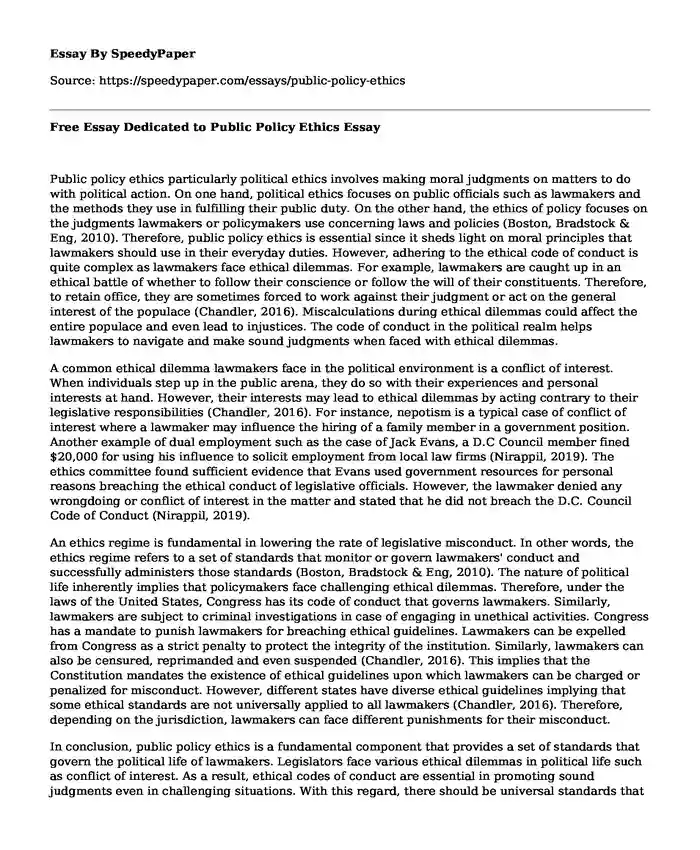
| Type of paper: | Research paper |
| Categories: | Ethics Public policy |
| Pages: | 3 |
| Wordcount: | 670 words |
Public policy ethics particularly political ethics involves making moral judgments on matters to do with political action. On one hand, political ethics focuses on public officials such as lawmakers and the methods they use in fulfilling their public duty. On the other hand, the ethics of policy focuses on the judgments lawmakers or policymakers use concerning laws and policies (Boston, Bradstock & Eng, 2010). Therefore, public policy ethics is essential since it sheds light on moral principles that lawmakers should use in their everyday duties. However, adhering to the ethical code of conduct is quite complex as lawmakers face ethical dilemmas. For example, lawmakers are caught up in an ethical battle of whether to follow their conscience or follow the will of their constituents. Therefore, to retain office, they are sometimes forced to work against their judgment or act on the general interest of the populace (Chandler, 2016). Miscalculations during ethical dilemmas could affect the entire populace and even lead to injustices. The code of conduct in the political realm helps lawmakers to navigate and make sound judgments when faced with ethical dilemmas.
A common ethical dilemma lawmakers face in the political environment is a conflict of interest. When individuals step up in the public arena, they do so with their experiences and personal interests at hand. However, their interests may lead to ethical dilemmas by acting contrary to their legislative responsibilities (Chandler, 2016). For instance, nepotism is a typical case of conflict of interest where a lawmaker may influence the hiring of a family member in a government position. Another example of dual employment such as the case of Jack Evans, a D.C Council member fined $20,000 for using his influence to solicit employment from local law firms (Nirappil, 2019). The ethics committee found sufficient evidence that Evans used government resources for personal reasons breaching the ethical conduct of legislative officials. However, the lawmaker denied any wrongdoing or conflict of interest in the matter and stated that he did not breach the D.C. Council Code of Conduct (Nirappil, 2019).
An ethics regime is fundamental in lowering the rate of legislative misconduct. In other words, the ethics regime refers to a set of standards that monitor or govern lawmakers' conduct and successfully administers those standards (Boston, Bradstock & Eng, 2010). The nature of political life inherently implies that policymakers face challenging ethical dilemmas. Therefore, under the laws of the United States, Congress has its code of conduct that governs lawmakers. Similarly, lawmakers are subject to criminal investigations in case of engaging in unethical activities. Congress has a mandate to punish lawmakers for breaching ethical guidelines. Lawmakers can be expelled from Congress as a strict penalty to protect the integrity of the institution. Similarly, lawmakers can also be censured, reprimanded and even suspended (Chandler, 2016). This implies that the Constitution mandates the existence of ethical guidelines upon which lawmakers can be charged or penalized for misconduct. However, different states have diverse ethical guidelines implying that some ethical standards are not universally applied to all lawmakers (Chandler, 2016). Therefore, depending on the jurisdiction, lawmakers can face different punishments for their misconduct.
In conclusion, public policy ethics is a fundamental component that provides a set of standards that govern the political life of lawmakers. Legislators face various ethical dilemmas in political life such as conflict of interest. As a result, ethical codes of conduct are essential in promoting sound judgments even in challenging situations. With this regard, there should be universal standards that apply to all lawmakers irrespective of their jurisdiction. There should be federal regulations or standards that govern lawmakers and code of conduct committees should include outsiders to ensure fair and just ethical punishments.
References
Boston, J., Bradstock, A., & Eng, D. (2010). Ethics and public policy. Public Policy: Why Ethics Matters. Doi: 10.22459/pp.10.2010.01
Chandler, J. (2016). Public Policy and Private Interest: Ideas, Self-Interest and Ethics in Public Policy. Oxfordshire, England: Taylor & Francis.
Nirappil, F. (2019, August 8). Retrieved from https://www.washingtonpost.com/local/dc-politics/dc-lawmaker-jack-evans-fined-20000-in-ethics-case-involving-outside-work/2019/08/08/4c2fa010-ba0b-11e9-a091-6a96e67d9cce_story.html
Cite this page
Free Essay Dedicated to Public Policy Ethics. (2022, Feb 24). Retrieved from https://speedypaper.com/essays/public-policy-ethics
Request Removal
If you are the original author of this essay and no longer wish to have it published on the SpeedyPaper website, please click below to request its removal:
- Memorandum for a Paperless Office. Free Essay Sample.
- Essay Sample: Trajectories of Criminal Behavior
- Analysis of Trevor Jones - Free Essay on Child Development
- Should Drug Offenders Go to Prison? Get the Answer in the Free Essay
- Essay Sample: Effects of Marine Activity on MPA
- Fulop, M. T., & Pintea, M. O. (2014). Effects of the new regulation and corporate governance of the audit profession. SEA-Practical Application of Science, 2(3), 5. HYPERLINK "https://econpapers.repec.org/RePEc:kap:jbuset:v:114:y:2013:i:3:p:457-471"
- Essay Sample on Foreign Investment Strategies
Popular categories




